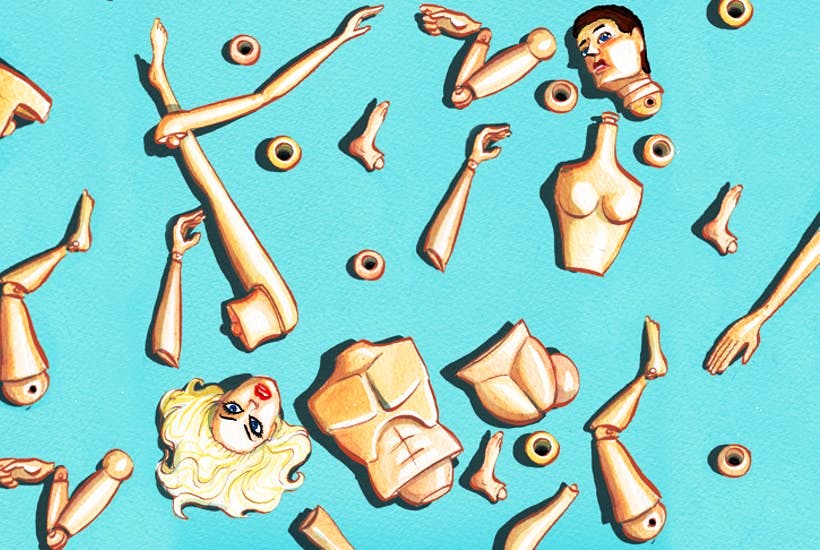‘Families marching five by five
Hurrah! Hurrah!
Families marching five by five
Hurrah! Hurrah!
Some people choose their family
And they love each other so proudly
And they all go marching in
The Big Parade!’
In June, the Journal of Medical Ethics spelled out what it means in practice to teach children that family bonds are optional. If the world is to ‘take LGBT testimony seriously,’ argued Maura Priest, a bioethicist at the Arizona State University, then ‘parents should lose veto power over most transition-related pediatric care’.
In many states, this is already well-established. In 2015, Oregon passed a law giving minors the right to receive transgender medical interventions at taxpayers’ expense, and without their parents’ consent. In Washington State, minors age 13 and up can self-admit for mental health conditions and withhold records from parents for ‘sensitive’ conditions. Insurers in the state are required to cover care for ‘gender-affirming treatments’. And in April 2021, Washington State legislated to authorize school-based health centers whose services can be accessed without any parental involvement. Taken together, these ensure that medical interventions associated with trans identity can thus be accessed by any child over the age of 13 via a school-based clinic, covered by parents’ insurance, without any parental knowledge or consent.
It’s increasingly common, then, for American legal structures and social norms to reflect a belief that parental authority over kids should give way to a minor’s self-declared identity. This extends even to irreversible surgical interventions such as double mastectomy. And even as states begin to enshrine the right of minors to alter their bodies medically in the name of identity, so too medical bodies are pushing for political changes that raise the legal standing of human identity over that of the human body. A few weeks after the JME article, the American Medical Association declared in a report by its Board of Trustees that sex designation should be removed from the public portion of birth certificates.
Many individuals have a ‘gender identity’ that doesn’t align with biological sex, the AMA argued. When identity documents list biological sex, this can ‘result in confusion, possible discrimination, harassment and violence whenever their birth certificate is requested’. In order to shield identity from challenge, sex should be discarded from identity documents. Implicitly, then, even America’s leading medical association views identity as more important than biology.
This is perhaps unsurprising, when individual self-realization is so entrenched in American culture that it forms a common plotline for kids’ movies. Both Antz (1998) and Happy Feet (2006), for example, concern misfit animals who defy the accident of being born into a particular species, and save the day by becoming who they really are.
Related, and equally entrenched, is a long-standing belief in the equal dignity of all people: the central premise of the civil rights movement. Dignity, equality and self-actualization position trans rights as a continuation of existing civil rights struggles. And nowhere is this more poignantly embodied than in the ‘transgender child’, whose blend of youthful innocence, personal struggle and triumph over the accident of being born the ‘wrong’ sex forms the relatable face of the movement.
Such young people appear with growing regularity in media and campaigning literature. From the TLC reality show I Am Jazz, which documents the ‘transition’ of Jazz Jennings, through the 2020 HBO documentary Transhood to the vlogs and TikTok accounts of young transgender people documenting their transitions, trans youth are increasingly visible. Their stories usually recount individual suffering and a personal journey toward self-realization, while discussion of trans youth in general often warns that obstructing such journeys risks condemning children to self-harm and suicide.
Behind the activist vocabulary of oppression and rights, and the ‘trans kids’ tugging on our heartstrings, stands a campaign with deep pockets and deeper scope. This movement seeks to end all cultural and legal recognition that our bodies shape our selves, and to reimagine humans as creatures purely of mind. If it succeeds, it will launch us into a profoundly post-human age.
Perhaps the clearest exponent of this vision is the transgender biopharma entrepreneur Martine Rothblatt, who argued in The Apartheid of Sex (1995) that ‘the course of progress in civilization has been to render as irrelevant as possible the birth status of a particular individual’. Thanks to medical advances that enable humans to remodel their own bodies, Rothblatt argues, biological sex is now merely an accident of ‘birth status’. Progress means unchaining individuals from the arbitrary nature of bodily sex, in the name of, as Rothblatt puts it, ‘the full cultural liberation of all people’.
Also implicit in Rothblatt’s argument is the ‘cultural liberation’ of minors from parental authority. For if sex is an accident of birth, so is parental identity. If parents are blocking self-realization, then parents must give way — a view that now has heavy-hitting backers. A 2019 document produced by law colossus Dentons in partnership with the Thomson Reuters Foundation and the International Lesbian, Gay, Bisexual, Transgender, Queer & Intersex Youth and Student Organization advises campaigners to pursue government policies limiting the power of ‘parental consent’ to obstruct ‘the free development of a young trans person’s identity’.
But this is a civil rights campaign with a difference: it seeks not to raise awareness of its mission, but to minimize it. Dentons advises NGOs to work as far as possible behind the scenes, for example by publishing ‘progressive legislative proposal[s] before the government [has] time to develop their own’. Once the legislative process is underway, campaign groups are encouraged to piggyback desired changes onto more popular ones that can provide ‘a veil of protection’.
This, then, is a movement that knows its agenda will not be popular. On the face of it, it’s not clear why. The estimated proportion of the US population that is transgender is tiny: around 0.6 percent, according to a 2016 UCLA study. Who cares about changes that affect so few people? And yet popular resistance to these changes is widespread. In 2021 alone, the debate over trans rights triggered adversarial legislative battles in 33 states.
Support is stratified by social class, with elites far more accepting: one 2015 US study shows educational attainment, a proxy for socioeconomic class, predicted greater likelihood of transgender acceptance. What of those who demur? One trans-supportive 2013 paper in Sex Roles characterizes objections as rooted in ‘authoritarianism’, ‘anti-egalitarianism’, ‘religiosity’ and ‘the widespread assumption that sex and gender are “naturally” dichotomous’.
In other words, resistance is rooted in the now-deprecated popular intuition that there exists such a thing as a ‘natural’ order, however arbitrary this is, and that it ought to be treated with respect. Today this is a low-status worldview. Prevailing elite norms bracket the word ‘natural’ in scare quotes, as in the Sex Roles paper, and any invocation of ‘nature’ is read as a stalking horse for male, white or some other type of privilege.
But the covert approach taken by trans rights campaigners points not just to a wish to smuggle progressive policies past a recalcitrant rump of reactionaries, but something else, too: the fact that this isn’t really about 0.6 percent of the population. Rather, it’s a political drive to reimagine what humans are.
Giving legal priority to identity over biology strips institutional protection from the already low-status belief that humans have a ‘nature’. In turn, this opens new ground for the rapidly advancing field of biomedicine. And in this sense, despite the evidently genuine suffering of many transgender individuals, the political campaign for trans rights resembles less a civil rights movement than the push for financial deregulation in the Eighties and Nineties.
This campaign to deregulate the human body began in earnest in 1996, when Martine Rothblatt co-authored the International Bill of Gender Rights. This document, an instance of the ‘progressive legislative proposals’ approach advocated by Dentons, sought to provide a legislative template for elevating ‘gender identity’ over biological sex. This approach was taken up again in 2006, when a group of lawyers and activists drafted the Yogyakarta Principles, another progressive piece of template legislation proposing ‘universal’ LGBT rights including legal primacy of ‘gender identity’.
Then in June this year, a US-led ‘side event’ to the United Nations Human Rights Commission meeting proclaimed a ‘new fundamental duty of the state’ to ‘recognize every human being’s freedom to determine the confines of their existence, including their gender identity and expression.’ In other words, the belief that identity takes precedence over biology is now on track to being institutionalized in the ‘rules-based international order’.
But the right to switch legal designation from male to female, or vice versa, is only the beginning of the drive to end all claims of the body on selfhood. In 2017, the original Yogyakarta Principles became ‘Yogyakarta Plus 10’, which argues for legal recognition not just of individuals who have ‘transitioned’ from one sex to another, but of identities that reject ‘male’ and ‘female’ altogether.
Twenty-one US states permit ‘nonbinary’ gender markers on identification documents, a shift accompanied by a growing market for ‘nonbinary’ medical alterations. Examples include hormone regimens aimed at creating a less-than-total masculinizing or feminizing effect; the creation of a neovagina without amputating the penis; even ‘nullification’ surgery, a procedure in which primary sex characteristics are as far as possible eliminated.
From here, it’s a short step to arguing identity isn’t contingent on being humanoid at all, or even physical. In 2011, Rothblatt reissued The Apartheid of Sex under the title From Transgender to Transhuman, arguing that ‘freedom of gender is…the gateway to a freedom of form’.
‘Humanness is in the mind,’ Rothblatt asserts. And once we realize we’re not constrained by our sex, it’s only a short step to ‘the awakening that we are not limited by our anatomy at all’. Rothblatt imagines a new species emerging: Persona creatus, a new kind of entity with biological, digital and hybrid members.
No one has yet succeeded in uploading human consciousness to the internet, so it’s easy to dismiss this as eccentric science fiction. But the implications of undermining human morphological norms are already with us. In April this year the scientific journal Cell detailed an experiment where chimeric human/monkey embryos were created and kept alive for 20 days in a petri dish. There was some popular outcry, but little institutional resistance: indeed, in May the Senate voted down an amendment to the Endless Frontiers Act, a technological development bill, that would have banned further experiments in human/animal chimeras.
The idea that humans even have a ‘nature’ is low-status, meaning elite support for constraining scientific progress in defense of that nature is sparse. And as was the case with finance in the Reagan era, deregulating human nature is in elite interests. The upsides in transgender medicine alone are considerable, and still greater in bioengineering more generally.
In transgender medicine, the market for hormone therapies was estimated at $21.8 billion in 2019 and expected to grow by nearly 8 percent year on year. Surgeries are also a growing area, worth an estimated $267 million in 2019 and expected to grow at a compound annual rate of 14 percent to 2027, according to Grand View Research. A report authored by business intelligence researchers Global Market Insight suggested that the market for ‘gender confirmation’ surgeries is expected to exceed $1.5 billion by 2026.
This offers considerable opportunities for entrepreneurial providers in insurance-based systems. This fact may help account for the consensus across nearly every major American medical association in favor of unquestioning ‘affirmation’ of transgender identity, including for minors. By contrast, in countries where healthcare provision is socialized, medical providers are proving more cautious. In Sweden, drugs that halt puberty have been withdrawn from taxpayer-funded clinics, and Britain’s only NHS gender clinic recently halted new referrals for such treatment pending review.
But the commercial potential in deregulating the manipulation of human bodies goes well beyond transgender medicine. Biotechnology is a growth area, despite the global economic shock of coronavirus: according to a 2021 McKinsey report, in 2020 the average share price for European and US biotech firms increased at more than double the rate of the S&P 500.
The goal of the research into monkey/human chimeras was, as the paper published in Cell notes, the advancement of regenerative medicine including ‘the generation of organs and tissues for transplantation’. When the demand for donated organs so far outstrips the supply of willing donors, it’s not difficult to see the incentives to pursue such research.
If we see all of biology as plastic, with no meaningful constraints of norm or nature, human/animal chimeras are not monstrous but exciting and rich with potential. Popular revulsion at meddling with what’s ‘natural’ is a key constraint on this emerging field.
Meanwhile, those with shares in biotech (or simply a wish to see the economy grow) are looking longingly at the commercial possibilities opened up by human deregulation, and blue-sky thinkers are already brainstorming its political scope. Earlier this year, Matthew Liao, NYU Ethics Chair and editor-in-chief of the Journal of Moral Philosophy, suggested addressing the carbon emissions resulting from livestock farming for meat by manipulating the human genome to make people allergic to meat.
Perhaps unsurprisingly, as documented by Jennifer Bilek in First Things last year, we find many promoters of transgender identities are linked to the pharmaceutical and biotech industries. One such funder is the Arcus Foundation, which awards grants to groups including the LGBT campaign group the International Lesbian, Gay, Bisexual, Trans and Intersex Association, the LGBT Movement Advancement Project and Transgender Europe, which channels money into state-level campaigns for the legal recognition of gender identity. Its founder is Jon Stryker, billionaire heir to a fortune made in surgical supplies and software. And Martine Rothblatt is one of the highest-paid CEOs in biopharma, with a 2019 pay package of $45.65 million.
None of this need be based in conspiracy; just in things people want to believe, whether out of financial self-interest or simply a longing to ‘be who I really am’. Proponents of financial deregulation were likely sincere in imagining their proposed changes would benefit consumers. But much as these changes turned out largely to benefit Wall Street at the expense of Main Street, so too the targets of deregulation now are norms and beliefs more widely held on Main Street. Again, it’ll be Wall Street that cashes in, as biotech firms benefit from the disappearance of these norms.
The deregulatory drive is framed as a matter of civil rights, self-actualization and alleviating the suffering of innocent children. Objections are characterized as bigotry, or a desire to deprive LGBT children of medical care, even a willingness to see children commit suicide. The effect of these emotive arguments is to legitimize a new vision of humans as pure identity.
We should think hard before we embrace this vision. For a politics that celebrates the individual as pure mind will also view our bodies as mere flesh, to be managed and optimized. If humanness is ‘in the mind’, our bodies are mere meat. And you can do what you like with meat.
This article was originally published in The Spectator’s September 2021 World edition.


















